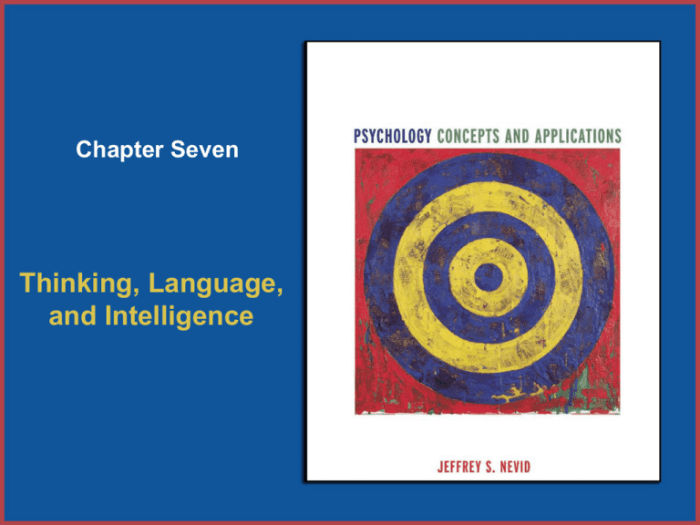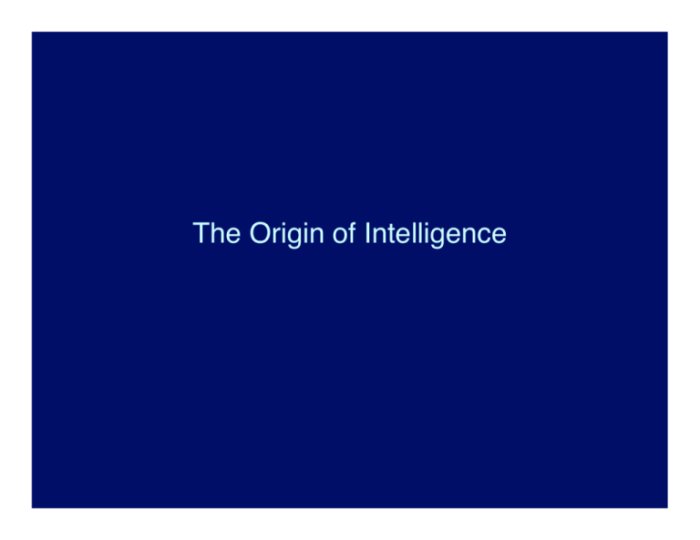The origin of intelligence studysync – Embarking on an intellectual journey into the genesis of intelligence studysync, we delve into the intriguing origins and evolution of a field that has profoundly shaped our understanding of intelligence and its multifaceted applications. This exploration traces the historical roots, theoretical foundations, and practical methodologies that have laid the groundwork for this dynamic discipline.
From its humble beginnings to its current prominence, intelligence studies has emerged as a critical tool for decision-making, policy formulation, and national security. By examining the interplay of factors that have contributed to its growth, we gain insights into the individuals and institutions that have left an enduring mark on the field.
The History of Intelligence Studies

Intelligence studies is a relatively new field, with its origins in the early 20th century. The field was born out of the need to understand and counter the growing threat of espionage and sabotage during World War I.
In the years after the war, intelligence studies began to develop as a more formal discipline. Scholars and practitioners began to develop theories and methods for collecting, analyzing, and interpreting intelligence. The field also began to attract the attention of policymakers, who saw the value of intelligence in making informed decisions.
Major Figures and Institutions, The origin of intelligence studysync
A number of major figures have contributed to the development of intelligence studies. These include:
- Sir Basil Liddell Hart, a British military historian and strategist who wrote extensively about intelligence
- Allen Dulles, the first director of the Central Intelligence Agency (CIA)
- Sherman Kent, a CIA analyst who developed a number of important theories about intelligence analysis
A number of institutions have also played a major role in the development of intelligence studies. These include:
- The CIA
- The National Intelligence University
- The International Association for Intelligence Education (IAFIE)
Theories of Intelligence

Intelligence is a complex and multifaceted concept that has been the subject of much debate and research. Over the years, numerous theories of intelligence have been proposed, each with its own strengths and weaknesses.
Psychometric Theories
Psychometric theories of intelligence focus on measuring and quantifying intelligence through standardized tests. These tests typically assess cognitive abilities such as verbal comprehension, mathematical reasoning, and spatial visualization. Psychometric theories have been widely used in educational and occupational settings to identify and assess individuals with high levels of intelligence.
Strengths:
* Objective and reliable: Psychometric tests provide standardized and objective measures of intelligence.
Predictive validity
Scores on psychometric tests have been shown to correlate with academic and occupational success.
Weaknesses:
* Narrow definition: Psychometric theories focus primarily on cognitive abilities and may not capture other aspects of intelligence, such as creativity or emotional intelligence.
Cultural bias
Psychometric tests may be biased towards certain cultural groups, making it difficult to compare scores across different populations.
Cognitive Theories
Cognitive theories of intelligence focus on the mental processes and structures that underlie intelligent behavior. These theories propose that intelligence is a product of cognitive abilities such as attention, memory, problem-solving, and decision-making. Cognitive theories have been influential in the development of educational programs and interventions aimed at enhancing cognitive skills.
Strengths:
* Process-oriented: Cognitive theories provide insights into the mental processes involved in intelligent behavior.
Developmental perspective
Cognitive theories often focus on the development of intelligence over time, providing a more comprehensive understanding of how intelligence changes throughout the lifespan.
Weaknesses:
* Difficult to measure: Cognitive abilities are often difficult to measure directly, making it challenging to test and verify cognitive theories.
Limited predictive validity
While cognitive abilities are important for success in many areas, they may not always be the best predictors of real-world performance.
Contextual Theories
Contextual theories of intelligence emphasize the role of environmental and cultural factors in shaping intelligence. These theories argue that intelligence is not a fixed trait but rather a product of the interactions between an individual and their environment. Contextual theories have been used to explain differences in intelligence across cultures and socioeconomic groups.
Strengths:
* Emphasizes the role of environment: Contextual theories provide a more holistic view of intelligence, taking into account the influence of factors such as culture, education, and social support.
Addresses cultural bias
Contextual theories can help to reduce cultural bias in intelligence testing by considering the cultural context in which intelligence is expressed.
Weaknesses:
* Difficult to operationalize: Contextual factors are often difficult to measure and operationalize, making it challenging to test and verify contextual theories.
Overemphasis on environment
Contextual theories may overemphasize the role of environment, neglecting the importance of genetic factors in intelligence.
Implications for Intelligence Analysis and Policymaking
Theories of intelligence have important implications for intelligence analysis and policymaking. Psychometric theories provide a standardized and objective way to assess intelligence, which can be useful for identifying and selecting individuals for intelligence roles. Cognitive theories offer insights into the mental processes involved in intelligence, which can be used to develop training programs and interventions to enhance cognitive skills.
Contextual theories highlight the role of environmental and cultural factors in shaping intelligence, which can be taken into account when developing policies and programs aimed at improving intelligence outcomes.By understanding the strengths and weaknesses of different theories of intelligence, intelligence analysts and policymakers can make more informed decisions about how to assess and develop intelligence capabilities.
Methods of Intelligence Analysis: The Origin Of Intelligence Studysync

Intelligence analysis involves gathering, evaluating, and interpreting information to provide decision-makers with insights and recommendations. Various methods are employed in this process, each with its strengths and weaknesses.
Open Source Intelligence (OSINT)
OSINT refers to information publicly available through sources such as news outlets, social media, and government reports. It offers a wide range of perspectives and can provide insights into public opinion, political dynamics, and economic trends. However, it can be challenging to verify the accuracy and reliability of OSINT.
Human Intelligence (HUMINT)
HUMINT involves gathering information through human sources, such as spies, informants, and undercover agents. It allows for direct access to individuals and organizations of interest, providing valuable insights into their plans, intentions, and capabilities. However, HUMINT operations can be risky and time-consuming, and the information obtained may be biased or incomplete.
Signals Intelligence (SIGINT)
SIGINT involves intercepting and analyzing electronic signals, such as radio communications, telephone calls, and internet traffic. It provides access to real-time information on a large scale, but it can be challenging to interpret and may raise privacy concerns.
Geospatial Intelligence (GEOINT)
GEOINT combines geographic data, imagery, and other geospatial information to provide insights into physical environments, terrain, and infrastructure. It is useful for assessing potential threats, planning operations, and understanding the movement of people and resources. However, GEOINT may not always be readily available or up-to-date.
Ethical Considerations
Intelligence analysis must be conducted ethically, taking into account the potential risks and benefits. Considerations include:
- Privacy and civil liberties: Ensuring that intelligence gathering does not violate individual rights or compromise personal data.
- Accuracy and reliability: Verifying the accuracy and reliability of information before it is disseminated.
- Transparency and accountability: Providing oversight and transparency in intelligence activities to ensure that they are conducted in accordance with the law.
The Role of Intelligence in Policymaking

Intelligence plays a critical role in policymaking by providing decision-makers with information and analysis to support their decisions. Intelligence can help policymakers understand the world around them, anticipate future events, and develop effective policies to address challenges.
However, using intelligence to make decisions can be challenging. Intelligence is often incomplete, uncertain, and subject to bias. Policymakers must carefully evaluate the quality of intelligence and consider the potential risks and benefits of acting on it.
Examples of Intelligence Use in Policymaking
- In 2003, the United States invaded Iraq based on intelligence that Iraq possessed weapons of mass destruction. This intelligence turned out to be false, and the invasion led to a long and costly war.
- In 2011, the United States used intelligence to track down and kill Osama bin Laden, the leader of al-Qaeda. This intelligence was accurate, and the raid was successful.
- In 2014, the United States used intelligence to anticipate the rise of ISIS and develop a strategy to defeat the group.
The Future of Intelligence Studies

The future of intelligence studies is bright. The field is growing rapidly, and there is a growing demand for intelligence analysts. This is due to the increasing complexity of the world and the need for governments and businesses to make informed decisions.
There are a number of challenges that the field of intelligence studies faces. One challenge is the need to keep up with the rapidly changing world. The world is becoming increasingly complex, and intelligence analysts need to be able to understand and analyze this complexity.
Another challenge is the need to protect intelligence sources and methods. Intelligence analysts need to be able to collect and analyze intelligence without compromising their sources or methods.
There are also a number of opportunities for the field of intelligence studies. One opportunity is the development of new technologies. New technologies can help intelligence analysts collect and analyze intelligence more efficiently and effectively. Another opportunity is the increasing availability of data.
Data can be used to help intelligence analysts understand and analyze the world. By combining new technologies with the increasing availability of data, intelligence analysts can better inform governments and businesses.
There are a number of recommendations that can be made to strengthen the field of intelligence studies and ensure its continued relevance. One recommendation is to increase the funding for intelligence studies. This would allow for more research and development in the field.
Another recommendation is to improve the training of intelligence analysts. Intelligence analysts need to be able to understand and analyze the complex world. By improving their training, they can better inform governments and businesses.
Challenges
- Keeping up with the rapidly changing world
- Protecting intelligence sources and methods
Opportunities
- Development of new technologies
- Increasing availability of data
Recommendations
- Increase funding for intelligence studies
- Improve the training of intelligence analysts
Query Resolution
What is the primary focus of intelligence studies?
Intelligence studies encompasses the systematic collection, analysis, and interpretation of information to provide insights into foreign governments, organizations, and individuals that may pose threats or opportunities to national security and policymaking.
How has technology influenced the field of intelligence studies?
Technological advancements have revolutionized intelligence gathering and analysis, enabling the use of sophisticated surveillance techniques, data mining, and artificial intelligence to enhance the accuracy and efficiency of intelligence operations.
What are the ethical considerations in intelligence analysis?
Intelligence analysts must adhere to strict ethical guidelines to ensure the privacy of individuals, protect sources, and avoid bias in their assessments. These guidelines help maintain public trust and the integrity of the intelligence process.
